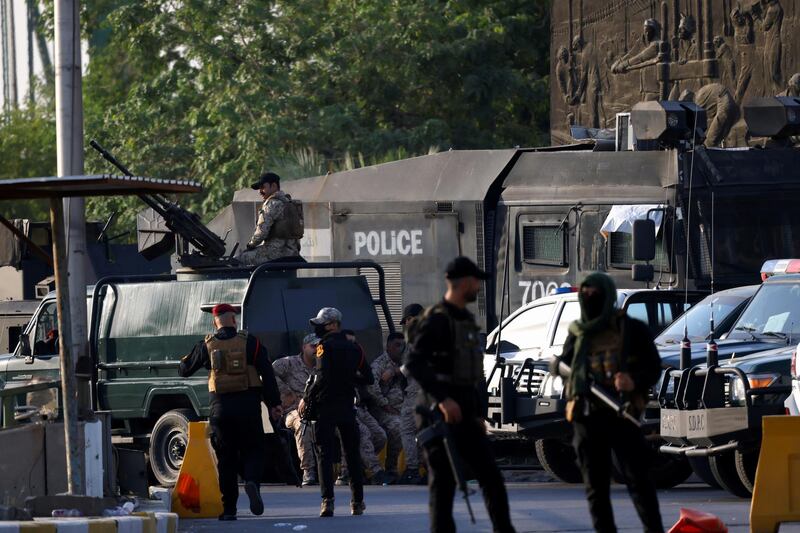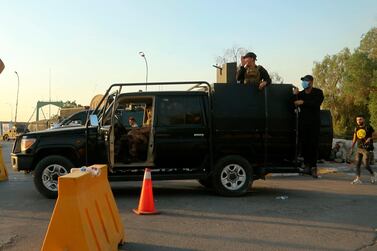Iraq's refusal to release paramilitary commander Qassem Musleh a week on from his surprise arrest could lead to long-term security repercussions, experts have told The National.
Mr Musleh, leader of Popular Mobilisation Forces (PMF) operations in Anbar province, was arrested in Baghdad last Wednesday on suspicion of terrorism and in connection with the targeted killing of civil society activists and protesters.
Tensions in the capital skyrocketed when PMF fighters taking to the streets around the office of Prime Minister Mustafa Al Kadhimi, prompting him to deploy Iraqi security forces and the elite Counter-Terrorism Service to protect the government and diplomatic missions.
The standoff sparked fears of violence as some armed PMF factions gathered at the entrance to the fortified diplomatic Green Zone in Baghdad. But, so far, the situation has remained stable.
A previous attempt by Mr Al Kadhimi to have PMF fighters arrested led to similar standoffs and threats of violence before the gunmen were ultimately let free.
But, Mr Musleh remains in custody and the Iraqi government believes it has solid evidence linking him to the recent assassination of activist Ihab Al Wazni in the southern city of Karbala. Judicial and security sources also told Reuters that he was wanted in connection to rocket attacks on US and international forces in Iraq.
The next step for Mr Al Kadhimi’s government will be to file charges and bring Mr Musleh in front of a judge.
Such a move will likely spark a heavy response from the hardline members of the PMF, an umbrella group of armed factions formed by the state to fight ISIS in 2014 but which now have significant weight in parliament and little official oversight. Many of the most capable and heavily armed groups receive training, support and equipment from Iran.
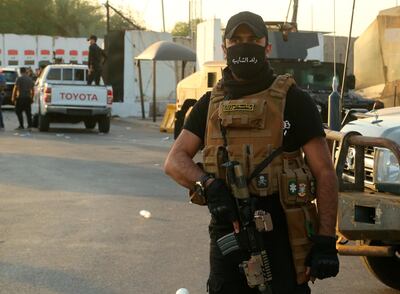
Protests and demands to have Mr Musleh freed are unlikely to be the only responses to his arrest but more action will likely play out in the coming weeks, said Renad Mansour, a senior research fellow and director of the Iraq initiative at London’s Chatham House.
"We've seen in the past after the raid on Kataib Hezbollah last year and the consequences of that including the targeting of people perceived to be close to the prime minister at that time," he told The National.
Last May, security forces arrested 14 members of the PMF faction Kataib Hezbollah. But, after threats of escalating violence from the group – one of the most powerful – the men were released.
Then in June, Hisham Al Hashimi, an Iraqi security expert, government adviser and close confident of the prime minister, was gunned down outside his home in Baghdad. No group claimed responsibility but Mr Al Kadhimi placed the blame on "outlaw" groups.
Where is Qassem Musleh?
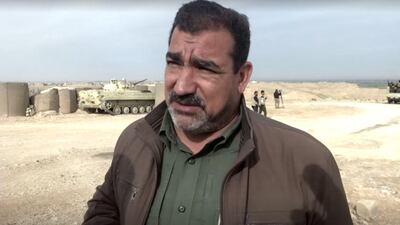
This time around, the government is playing around with the technicalities, Mr Mansour said.
Mr Musleh is in “a confinement but not in jail, he’s in a house and, basically, they are trying to come to terms with how best to sell and how each side could save face,” he explained.
One of the most serious criticisms being levelled at Mr Al Kadhimi "is that he’s not been able to do anything against impunity," he said.
An Iraqi intelligence official confirmed to The National that the PMF's security services department was holding Mr Musleh, but did not specify his exact location.
"The investigation into the killing of activists in Karabala and corruption is being carried by the Joint Operations Command in which all security forces are represented," said the official.
Mr Al Kadhimi is seen as having few means of reining in the militias without provoking a violent confrontation. He has not been able to bring to justice any of the killers of the 70 activists and reporters killed or indeed the more than 600 protesters killed by security forces since demonstrations against corruption, government failures and unemployment began in late 2019.
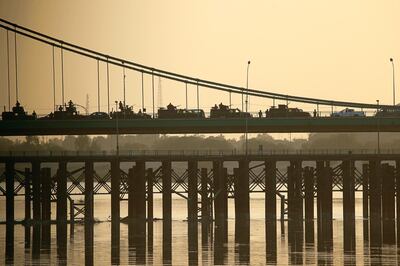
“The decision to arrest Musleh came from a very small circle that showed that Al Kadhimi was looking to exercise some teeth,” Mr Mansour said.
"The street has been calling for an end to the impunity of assassins and so the prime minister is seeking to try to take the call of the street and push forward with something," he said.
The day before Mr Musleh was arrested on May 26, thousands of people gathered on the streets of Baghdad and cities in southern Iraq to demand accountability for the killings of activists. Two were killed by security forces.
The PMFs will likely look to escalate their response to Mr Musleh’s arrest if charges are filed and he is brought before a judge, said Sajad Jiyad, a Baghdad based research fellow with the Century Foundation. They will, he explained, look to discourage such legal pursuit of their members.
“I think there will be a reaction if Musleh is not released and is convicted, there will be some sort of retaliation,” he said.
The PMF worries that letting this go ahead “would be the first step in other potential actions that they don’t want to encourage the government to pursue”.
But, Mr Jiyad admitted that just the fact that the government has been able to hold onto Mr Musleh for a week – especially in the face of the show of force in the capital – is significant in itself.
Additional reporting by Sinan Mahmoud in Baghdad.
